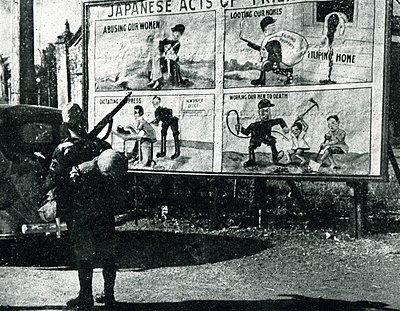Japanese occupation of the Philippines
| Japanese Occupation of the Philippines | ||||||||
|---|---|---|---|---|---|---|---|---|
| Part of the Pacific theater of World War II | ||||||||
 A Japanese soldier standing in front of an American propaganda poster during the occupation of the Philippines in 1943. |
||||||||
|
||||||||
| Belligerents | ||||||||
|
|
||||||||
| Unaffiliated Moro Muslim insurgents | ||||||||
| Commanders and leaders | ||||||||
|
GA Douglas MacArthur Pres. Manuel L. Quezon Pres. Sergio Osmeña Maj Gen. Basilio J. Valdez |
Pres. José P. Laurel |
Moro leaders
|
||||||
| Units involved | ||||||||
Resistance and
Irregular Forces
|
Imperial Japan
|
Hukbalahap fighters Moro Juramentados |
||||||
![]() Chairman Luis Taruc
Chairman Luis Taruc
Hukbalahap fighters
The Japanese occupation of the Philippines occurred between 1942 and 1945, when the Empire of Japan occupied the Commonwealth of the Philippines during World War II.
The invasion of the Philippines started on 8 December 1941, ten hours after the attack on Pearl Harbor. As at Pearl Harbor, American aircraft were severely damaged in the initial Japanese attack. Lacking air cover, the American Asiatic Fleet in the Philippines withdrew to Java on 12 December 1941. General Douglas MacArthur was ordered out, leaving his men at Corregidor on the night of 11 March 1942 for Australia, 4,000 km away. The 76,000 starving and sick American and Filipino defenders on Bataan surrendered on 9 April 1942, and were forced to endure the infamous Bataan Death March on which 7,000–10,000 died or were murdered. The 13,000 survivors on Corregidor surrendered on 6 May.
...
Wikipedia
